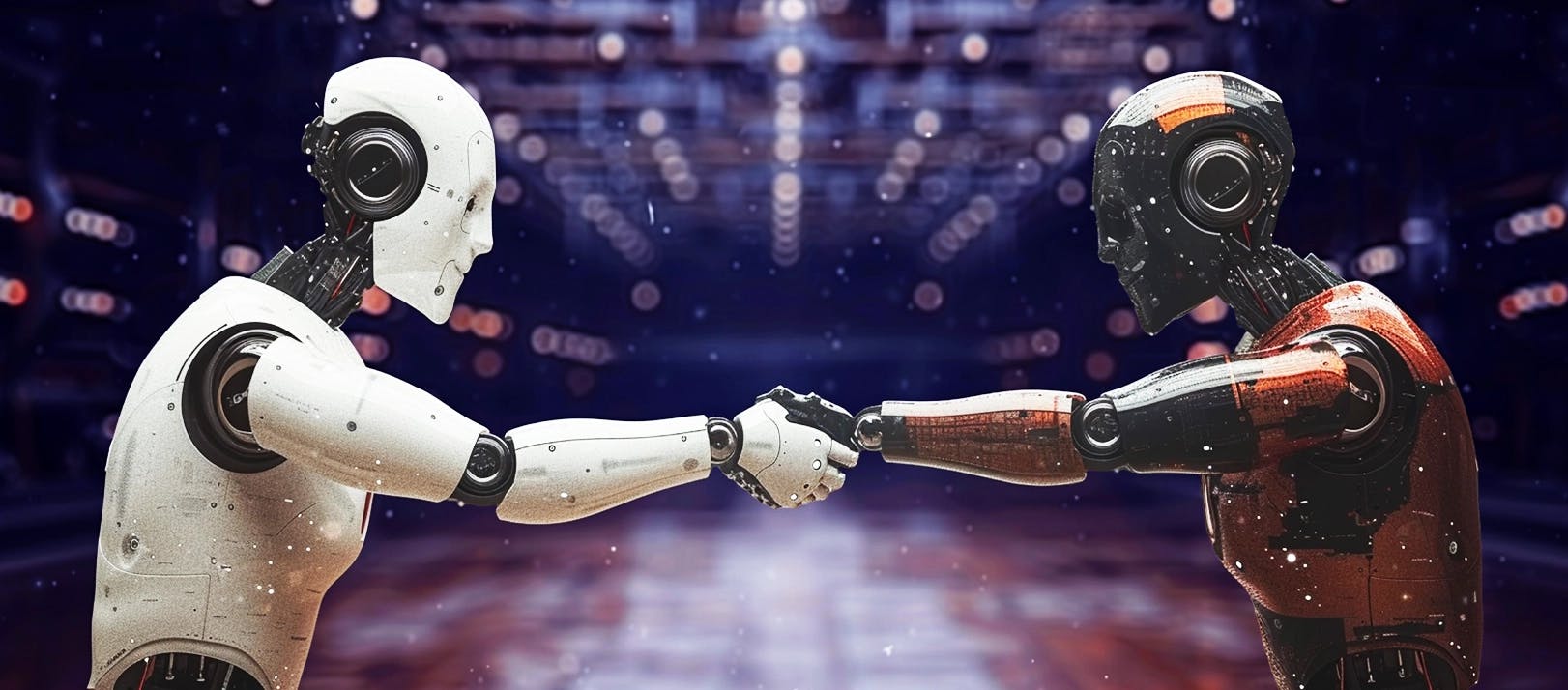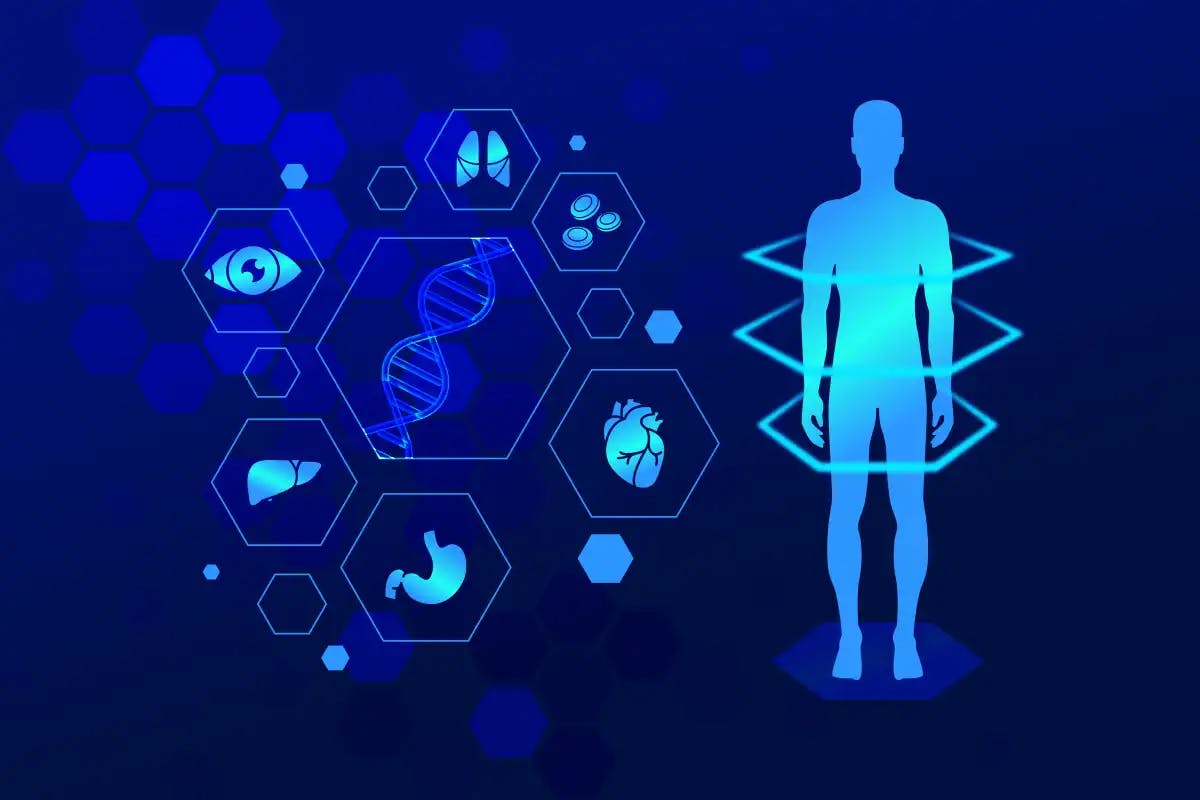
How Generative AI is nurturing the healthcare industry?
Generative Artificial Intelligence is a well-known technology designed to produce different types of content like synthetic data, audio, imagery, and text. It lets its users immediately generate new content as per different types of inputs. It focuses on creating new data samples resembling real-world data. Every user of the generative AI for the healthcare industry gets more than expected benefits.
The introduction of Gen AI has revolutionised the healthcare industry and boosted the productivity of providers. According to the reports of Accenture, nearly 98% of healthcare providers & executives spend their 40% of working hours supported by AI.
The market value of Gen-AI in the healthcare industry is expected to reach around 21.74 billion USD by 2032. This highlights the AI impact in the healthcare industry. Have you decided to unlock some of the untapped potential for enhancements in the competitive healthcare industry? Prefer using the generative AI hereafter to automate the tedious and repetitive work, modernise the healthcare systems’ infrastructure, and enhance the error-prone processes.
There are so many generative AI healthcare use cases at this time. However, some of them are clinical decision-making, risk prediction for catastrophic health events, customised medication and care, and enhanced drug discovery and development.
Top 5 Benefits of Using Generative AI in the Healthcare Industry
Everyone in the healthcare AI market is eager to know how to efficiently use modern resources and enhance the healthcare sector. You may wish to know about the main benefits of AI in healthcare at this time. The following details guide you about the important benefits of generative artificial intelligence in the healthcare sector.
- Efficiency Improvements for Enhanced Patient Diagnosis
AI helps medical professionals to make precise diagnoses in less than usual time. The main reasons for human error in healthcare settings are heavy caseloads and a lack of medical history. These errors are not possible when healthcare professionals start using generative AI.
AI in the healthcare sector provides precise diagnoses and administers effective therapies. It uses machine learning to make an algorithm and make a call or recognize whenever human guidance is needed. Though AI does not entirely replace people in the healthcare sector, it supplements available systems to enhance performance. - Virtual Nursing Assistants
Many patients are very comfortable with the efficient use of AI for 24/7 access to answers as support nurses provide. AI virtual nurse assistants are artificial intelligence-powered chatbots, applications, or other interfaces designed to help answer questions regarding medications, help patients schedule a visit with a physician, and forward reports to surgeons or doctors. If an AI does these repetitive tasks, then clinical staff can spend more time on patient care. This is because interaction and human judgment are very important. - Cost Reduction
Enhancing the efficiency of medical procedures, especially a diagnosis with an advanced AI is vital for significant cost savings. AI can sift through several medical photos for clues of sickness and stop the time-consuming and costly manual labor. You can research AI in healthcare examples and get an overview of how to enhance the health of patients almost immediately.
The enhanced efficiency of care leads to some patients needing to be admitted, less time is used and some beds only are used. The best AI can save costs in different healthcare settings like the robotic surgical process, and telehealth services, aiding the overall administrative processes, investigating fraud, and eliminating dosage mistakes. It is designed to learn and enhance accuracy, precision, and efficiency. - Ensure Safety in Surgeries
Qualified and committed surgeons worldwide use AI for specialised and effective support. The latest robots can enhance precision while working near very delicate organs and tissues. They lessen the requirements for maximum sutures, the severity of postoperative discomfort, and the possibility of infection. Every patient who undergoes the robotic surgical process can get a short recovery period. They are happy about their less noticeable scarring as the small incisions.
They make certain about the generative AI use cases in the healthcare industry at this time. Robots in the healthcare sector especially in the surgical process use commands in the form of hand gestures from the surgeons. - Betterment of Preventative Care
Individuals who concentrate on generative AI in healthcare examples are amazed and encouraged to enhance their healthcare services. An efficient use of artificial intelligence and machine learning controls infectious diseases. The ability of AI to process maximum volumes of data, especially health records, environmental parameters, and behavioural profiles makes it a good tool to stop pandemics, especially COVID-19.
AI has the best stuff to examine several molecules for drug testing and decreases the time needed for the complete research. Several benefits of artificial intelligence in the healthcare sector increase the eagerness of medical professionals and the confidence level of patients to use it and get well soon.
Challenges and Limitations of Generative AI in the Medical Industry
- Data Quality and Availability
A major challenge for AI models may be the quality of the available data. For AI models' clinical and technical validation, clinicians need access to high-quality datasets. However, the efficacy and reliability of AI models can be impacted by the fact that medical data is frequently chaotic, inconsistent, incomplete, or unstructured. Medical data is also private and sensitive, which makes data sharing and privacy protection difficult.
Another challenge is the availability of medical data for AI development and testing. Large, varied, and comprehensive datasets are necessary for the effective training of AI algorithms. Nonetheless, medical data is frequently compartmentalised within various healthcare systems and is bound by stringent privacy and security laws. One of the biggest challenges facing the medical industry is figuring out how to combine and distribute patient data while protecting patient privacy and data security.
The data used for AI health models must be precise, comprehensive, and up-to-date to produce reliable results. This will increase the quantity of data available for testing AI systems. - Integration with Existing Healthcare Systems
There is a significant challenge in integrating Gen AI in the healthcare industry. Sometimes, outdated healthcare systems lack the application programming interfaces (APIs) and data export techniques needed for simple data extraction and merging. The absence of common protocols and standards causes the interoperability problem. Since healthcare data is subject to varying standards, extracting and integrating information from multiple sources can be difficult.
For AI models to be effective, they must seamlessly integrate into the existing healthcare infrastructure. This procedure can be challenging and time-consuming. Ensuring interoperability with electronic health records and other healthcare technologies is crucial to maximise the capabilities and benefits of gen AI. - Physicians and Staff Training
Training medical personnel and professionals to use AI systems and understand the results they produce requires both time and resources. Doctors and engineers usually find it challenging to use AI that integrates multiple technologies because of the complexity and professionalism of medical knowledge and information technology.
Conversely, medical professionals may not fully understand the concepts and practical applications of AI products, which could lead to issues like decreased productivity and a rise in mistakes. Also, it's crucial to talk about the security of AI networks. If important nodes in the intricate network transmission process are compromised or fail, a worldwide cascading reaction might happen. - Regulatory Approval and Adoption
AI models cannot be utilised in the medical field until regulatory agencies have given their approval. This is a lengthy and costly procedure. Furthermore, the adoption of AI models by medical professionals may be slow, even after they have been approved. The most significant challenge facing AI solutions in healthcare is getting regulatory approval. AI systems must adhere to strict regulatory standards to protect patient privacy and security. The adoption of AI technologies in healthcare may be delayed by this procedure, which can be expensive and time-consuming.
The adoption of AI technologies by healthcare providers presents another difficulty. A large number of medical professionals may be resistant to change and are reluctant to trust AI systems. Issues concerning how AI will affect their jobs and the standard of patient care may also exist. The regulatory landscape surrounding gen AI in the medical field is complex and evolving. Navigating the approval process for integrating gen AI into clinical practice poses a challenge, with regulatory bodies needing to ensure patient safety and efficacy.
Top 5 Applications of Generative AI in healthcare
There have been several successful applications of artificial intelligence in hospitals worldwide in recent years. The efficient use of generative artificial intelligence has several applications in the competitive healthcare sector. You can focus on the following details revealing the applications of generative AI in the healthcare sector.
1. Automate Administrative Tasks
- What is it?
In general, Healthcare administrative tasks are the collaborative of non-clinical responsibilities such as managing the healthcare process of a patient, providing efficient support to the administrative team, and also ensuring data compliance as per the regulations. - Challenges Faced
Healthcare administration includes challenges, especially technology integration, data security, workforce training, regulatory compliance, resource constraints, patient engagement, and workflow disruptions. - How does Gen AI help?
The gen AI use case in the medical industry gives you an overview of how efficiently to use this modern technology. The Gen AI can help appoint scheduling, documentation, record-keeping, billing, claims processing, data entry and extraction, insurance verification, communication management, regulatory compliance checks, workflow optimization, task prioritisation, and patient outreach.
2. Medical Imaging
- What is it?
Medical imaging technology is nothing but a visual representation of the interior of the body which is used to conduct successful clinical analysis and medical intervention. They are used to diagnose, monitor, and treat various medical conditions. - Challenges Faced
They require efficient data management solutions and significant storage capacity. You must ensure privacy and security compliance while integrating medical imaging into the electronic health record systems. This is to prevent data breaches and unauthorized access. - How does Gen AI help?
Gen AI can help with image enhancement, data augmentation, noise reduction, super-resolution, image synthesis, automated segmentation, pathology prediction, customized medicine, and clinical decision support. Would you like to know about the top AI applications in healthcare in detail? You can research the basics of the top artificial intelligence applications in the medical sector and make an informed decision about how to efficiently use AI in your healthcare business.
3. Drug Discovery and Development
- What is it?
Drug discovery and development is a multi-stage process that is involved in almost all medical sectors, especially in scientific research, experimentation, and testing. It is useful to bring new drugs and help patients to get well soon. - Challenges faced
Manually managing drug discovery and development is expensive, time-consuming, and challenging. It includes the regulatory hurdles, complexity of biological systems, customized medicine, data integration, emerging technologies, ethical considerations, and global collaboration. - How does Gen AI help?
You can focus on the AI applications in healthcare examples and make certain significant aspects of Gen AI in drug discovery and development. Beginners in the healthcare profession think about how AI can be used in healthcare in detail. It helps to identify the target, validate, compound generation, predict drug-drug interactions, accelerate lead optimization, customised medicine, biomarker discovery, clinical trial design, data integration, and analysis, prediction of drug adverse effects, and repurposing existing drugs.
4. Medical Research and Data Analysis
- What is it?
Medical research and data analysis is a process of systematic way of investigating and examining patients associated with severe health issues and seeks attention through advanced scientific expertise to enhance patients’ health conditions. - Challenges Faced
The first and foremost concern when it comes to conducting medical research and data analysis based on the medical condition of a patient would be the patient’s privacy. Patient privacy must comply with the terms and conditions designed by HIPAA. Apart from that, in conducting complex biological data analysis AI must be well-versed or trained on the molecular components relationship. - How does Gen AI help?
Gen AI is used in efficient data processing, natural language processing, medical document summarization, trend analysis, search and retrieval, data integration, resource optimization, and predictive analytics. How has AI impacted the health industry? You can focus on the fundamentals of artificial intelligence in the complex healthcare sector and get an overview of how to efficiently use Gen AI in the medical sector. The main applications of AI in healthcare do not miss out on medical research and data analytics.
5. Risk Prediction of Pandemic Preparedness
- What is it?
Risk prediction and pandemic preparedness are about identifying new diseases. It involves predicting or analysing the spread of viral diseases across multiple countries or continents. - Challenges faced
It is not an easy thing as the rapid identification of pathogens. There are so many challenges like the timely acquisition of precise information, vaccine development and distribution-related complexities, and other things. - How does Gen AI help?
However, every GEN AI user in the healthcare sector is well aware of the vital role played by Gen AI in their profession and How is AI used in healthcare. Gen AI is used for early detection and surveillance, predictive analytics, vaccine development optimization, supply chain resilience, public communication enhancement, resource allocation optimization, and scenario planning.
Successful Implementations of Generative AI in Healthcare
Implementing generative AI solutions in healthcare requires careful planning and consideration of various factors to ensure successful integration and adoption. The blog intends to help healthcare organisations navigate the confusing array of options & tactics by dissecting the challenges and difficulties associated with implementing artificial intelligence (AI) in hospitals.
Here are some key steps to consider when implementing generative AI in healthcare:
- Identify Use Cases
To begin, identify the precise applications of generative AI use in healthcare such as personalised treatment planning, drug discovery, clinical decision support, and medical imaging analysis. Determining the most appropriate uses for generative AI healthcare will be made easier with an understanding of the unique requirements and difficulties faced by the medical organisation. - Collecting Data and Preparation
To train, validate generative AI, and prepare high-quality diverse datasets. Make sure genetic data, electronic health records, medical images, and other relevant health information could be part of it. In addition, verify that all the information collected fully complies with privacy laws like GDPR and HIPAA. - Model Development and Validation
Develop and validate generative AI models addressing the identified use cases in collaboration with data scientists, machine learning engineers, and healthcare professionals. It entails testing the models' functionality, confirming their accuracy and dependability in healthcare settings, and training the models using the prepared datasets. - Integration with Healthcare Systems
Connect the generative AI models to the current healthcare infrastructure, including electronic health record (EHR) systems, diagnostic tools, and medical imaging platforms. Assure smooth compatibility and interoperability with the company's IT infrastructure, taking data security and legal compliance into account. - Medical Validation and Regulatory Compliance
To evaluate the generative AI models' practical performance and effects on patient outcomes and healthcare workflows, comprehensive clinical validation studies should be carried out. Ensuring all regulations are followed is a must, especially when it comes to local healthcare laws or FDA approval for medical devices. Additionally, it's also vital to comply with these regulations to ensure the safety and well-being of everyone involved. - Monitoring and Continuous Improvement
Put in place mechanisms to keep an eye on the effectiveness and results of generative AI applications in the medical field. Additionally, keep improving the models in response to input and fresh information. To improve and optimise AI health solutions, data scientists, healthcare professionals, and patients may need to work together regularly. - Training and Education
Train medical professionals such as doctors, radiologists, pathologists, and other employees to employ generative AI healthcare tools in their clinical practices in an efficient manner. To achieve successful adoption and utilisation, this may entail seminars, instruction, and continuing support.
Generative AI has been used to simulate complex physiological processes and medical scenarios to train healthcare professionals and test medical devices. This has enabled the development of authentic medical simulations. - Ethical Considerations
The moral implications of applying generative AI to the healthcare industry, such as those about patient privacy, data security, and algorithm preference, must be taken into account, just like with other applications of AI in healthcare. Ensuring the responsible and transparent application of generative AI in healthcare, prioritising patient safety and well-being is imperative.
These strategies can help healthcare organisations successfully integrate generative AI technologies to enhance clinical decision-making, patient care, and the delivery of healthcare as a whole. For generative AI to be effectively implemented in healthcare, multidisciplinary teams, and stakeholders must be involved at every stage of the successful implementation process.
Conclusion
All users of AI tools for healthcare business development get the desired benefits and feel confident to recommend these tools to others. However, when it comes to developing efficient AI tools for your healthcare business, always consider approaching a reputed company like Codiste.
Codiste is a Top AI Development company delivering software solutions for all industrial verticals, including Healthcare. It is fully committed to providing customised and affordable Generative AI development services to every client with its qualified team. Every service from this company is designed to be enterprise-ready. You can explore the best Generative AI models developed by Codiste and make an informed decision to develop your business in the healthcare sector.
The above-listed best healthcare AI use cases guide you to decide on how to succeed in the competitive healthcare business. You can compare the top AI applications in medicine and use one of the most suitable applications as per your requirements. Contact us now!



Is Agentic RAG Worth the Investment? Age...
Know more
What is an AI Voice Agent for Customer C...
Know more
The Future of AI Automation: Agentic RAG...
Know more
